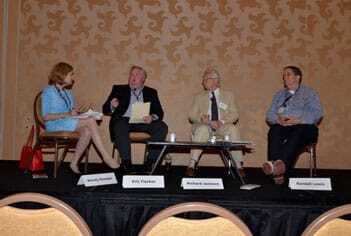- Almost 20 percent of the U.S. gross domestic product is spent on medical care, but only two percent is spent on health and wellness.
- Real estate developers can play an important role in creating more healthy communities; public health agencies can help win entitlements.
- Hospitals are moving away from being isolated disease treatment centers and becoming more integrated in their communities.
Many trends – including development patterns that encourage dependency on auto transportation – have converged to create today’s epidemic of obesity and lack of physical fitness, agreed speakers at ULI’s Spring Meeting in San Diego. Real estate developers have the opportunity to contribute to a reversal of at least some of these trends by creating more healthy communities – but doing so requires an extraordinary level of cooperation with the public sector, universities, hospitals, and community organizations.
Richard J. Jackson, M.D., a professor and Environmental Health Science chair at the University of California, Los Angeles’s Fielding School of Public Health, pointed out that today’s adults are 26 pounds heavier than those of the previous generation and 14-year-olds outweigh their predecessors by 14 pounds, while two out of every seven volunteers for the U.S. military are rejected due to obesity. Public health officials realize that when America drove away from its urban problems in the last century, a new set of problems arose.
“The purpose of public health is to ensure conditions in which people can be healthy,” Jackson said. “We now know that developers can be more effective in achieving public health than the doctors in white coats.” For this reason, public health agencies are starting to be involved in the land use approval process. “We have to be as effective in advocating for what’s good as we advocate against what’s bad,” he told attendees, adding that “health impact assessments” are likely to become as important as environmental impact assessments in the entitlement process.
“We work very hard to help communities plan in ways that promote health, which is an important a goal as economic development,” remarked Randall W. Lewis, executive vice president of California-based Lewis Operating Company. The linkage between economic development and health is clear, he noted: the fifth most dangerous job for a U.S. male, he noted, is having no job.
Eric W. Fischer, managing director of Trammell Crow, agreed with the linkage between economic development and health. “When we look at an initiative, it has to create jobs,” he said. Both jobs and healthy living are among the positive features of a new community in Washington, D.C., planned by a partnership of Trammell Crow, Jair Lynch Development Partners, and townhome developer EYA. This team was selected about five years ago to master-plan the 25-acre former McMillan Sand Filtration Site, designed by renowned landscape architect Frederick Law Olmsted, Jr. in the early 20th century. The focus on jobs and health, discussed during more than 30 community meetings, led to a decision to subsidize space for a full-scale grocery store onsite.
Promoting health in new communities is even more challenging when the budget is being stretched to provide affordable workforce housing, said session moderator Wendy A. Rowden, managing director of New York City-based Jonathan Rose Companies. One of the company’s latest projects is Via Verde, a mixed-use development in South Bronx, centered on a dynamic three-level garden used to grow food and provide open space for children and adult residents. (More Urban Land coverage of Via Verde.)
The importance of gardens and green space to human health and well-being is becoming clearer every year, noted Jackson. A study of people in waiting rooms of children’s cancer hospitals revealed that a view of green space cuts stress by half. Jackson also described the success of a hospital built on a California Indian reservation, incorporating a traditional healing garden and sweat lodges. The sweat lodges have proved successful in treating men who don’t feel comfortable undergoing psychotherapy. “And despite their original skepticism, who do you think uses the healing gardens the most?” he asked. The answer: doctors.





